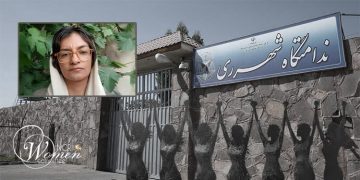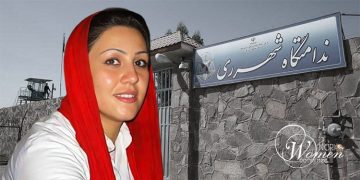Qarchak Prison in Varamin has once again become a focal point of humanitarian crisis. The recurring deaths of prisoners—primarily due to the systematic denial of medical treatment and the absence of even basic healthcare facilities—underscore both the structural violations of detainees’ rights and the deliberate negligence of judicial and prison authorities.
In the latest incidents, Soudabeh Asadi, an inmate imprisoned on financial charges, died on September 16 due to medical neglect and denial of treatment. She endured days of pain and illness without being transferred to a medical facility outside the prison.
On September 19, Jamileh Azizi, another financial prisoner, died inside the ward after prison infirmary staff ignored clear signs of cardiac arrest.
When Jamileh fell ill, the prisoners screamed and begged for help, but no one came. She died before the eyes of prisoners. Her eyes stayed open as she was carried out of the ward.
Somayeh Rashidi, a political prisoner, lost her life on September 25 after the prison authorities’ failure to transfer her in time to a hospital.
Somayeh collapsed and had seizures several times in front of her cellmates. The prison doctor said she was faking it. When her condition became critical, they finally transferred her, but only after a delay. That same day, the doctors said there was no hope for her recovery.
On January 11, another inmate by the name of Farzaneh Bijanipour died in Ward 6 of this prison due to medical neglect.
She was repeatedly taken to the infirmary in critical condition, but the prison doctor refused to treat her, saying she was “faking it.” The only medication prescribed was a single painkiller. By the time she was finally transferred to a hospital, she was already dead.

Qarchak prison suffers from unsafe drinking water and poor-quality food, a shortage of sanitary and medical supplies, lack of proper ventilation and adequate lighting, and severe overcrowding, with prisoners forced to sleep on the floor.
The infirmary lacks even the most basic equipment, such as a working blood-pressure monitor, a filled oxygen cylinder, or an active ECG machine. Prisoners are allowed to visit the infirmary only once a month, and in many cases, they are sent back to their ward with nothing more than a shared cold syrup or a single painkiller.
A prisoner currently held in Qarchak relayed in a phone call to her family: “When we go for checkups, our illnesses are dismissed. Instead, doctors and nurses insult us with phrases like, ‘You’re not dead yet?’ or ‘Better if you died sooner.’”
Known for its inhumane conditions, Qarchak Prison faces not only a healthcare crisis but also chronic shortages of water and electricity, a lack of cooling systems, dilapidated sanitary facilities, and the widespread outbreak of skin diseases.

Among those incarcerated are several political prisoners, including Parvin Mir-Asan, Maryam Akbari Monfared, Marzieh Farsi, and Shiva Esmaeili, who suffer from various illnesses and whose lives remain at grave risk.
The persistence of these conditions and the mounting death toll inside Qarchak Prison once again highlight the urgent need for an international inspection of this prison and interview with the inmates.
International human rights bodies and the global community need to hold the Iranian regime accountable and to demand an end to these blatant violations of fundamental human rights.
























